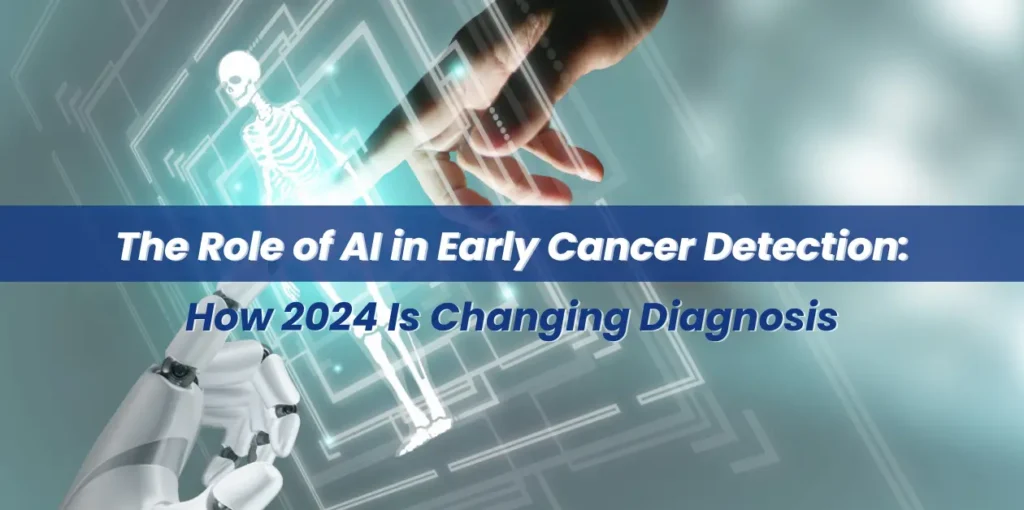The Role of AI in Early Cancer Detection: How 2024 Is Changing Diagnosis

Artificial intelligence (AI) is transforming healthcare, particularly in the field of oncology. In 2024, AI is playing a crucial role in early cancer detection, improving diagnostic accuracy, and enhancing patient outcomes. This blog explores how AI is revolutionizing cancer diagnosis and what the future holds.
How AI Works in Cancer Detection
Many people believe that cancer is solely determined by genetics. While genetics do play a role, lifestyle factors such as smoking, diet, and physical activity also significantly impact cancer risk. Studies show that up to 40% of cancers can be prevented through lifestyle changes. For example, smoking is a major risk factor for lung cancer, but quitting smoking can dramatically reduce this risk. Similarly, maintaining a healthy weight and staying physically active can lower the risk of several types of cancer, including breast and colorectal cancer.
Recent Advances in AI for Cancer Detection
In 2024, several AI-powered tools have been developed to improve cancer detection. For example, AI algorithms can now analyze mammograms with greater accuracy than human radiologists, reducing false positives and negatives. AI is also being used to detect lung cancer from CT scans and skin cancer from dermatological images. These advancements are particularly significant in regions with limited access to specialized healthcare professionals, as AI can provide high-quality diagnostic support remotely
AI in Mammography
Breast cancer is one of the most common cancers among women, and early detection is crucial for successful treatment. AI algorithms have been developed to analyze mammograms and identify suspicious areas that may indicate the presence of cancer. These algorithms can detect subtle changes in breast tissue that may be missed by human eyes, leading to earlier and more accurate diagnoses. In 2024, AI-powered mammography tools are being integrated into routine screening programs, improving the overall effectiveness of breast cancer screening.
Importance of Diet and Exercise - Cancer myths debunked
A healthy diet and regular exercise are essential for cancer prevention. Diets high in processed foods, red meat, and sugary drinks are linked to increased cancer risk. Conversely, diets rich in plant-based foods, fiber, and healthy fats can lower the risk. Physical activity helps maintain a healthy weight, reduces inflammation, and boosts the immune system, all of which contribute to cancer prevention. The World Cancer Research Fund recommends at least 150 minutes of moderate-intensity exercise per week, such as brisk walking or cycling. Additionally, incorporating strength training exercises can help build muscle and improve overall health.
AI in Lung Cancer Detection
Lung cancer is often diagnosed at a late stage, making it difficult to treat. AI is helping to change this by analyzing CT scans and identifying early signs of lung cancer. AI algorithms can detect small nodules and other abnormalities that may indicate the presence of cancer, even in its early stages. This early detection can significantly improve patient outcomes by allowing for earlier intervention and treatment.
AI in Skin Cancer Detection
Skin cancer is another area where AI is making a significant impact. AI-powered tools can analyze images of skin lesions and identify characteristics that may indicate the presence of cancer. These tools can differentiate between benign and malignant lesions with high accuracy, reducing the need for unnecessary biopsies and improving the overall efficiency of skin cancer screening.
Benefits of AI in Early Detection
AI offers several advantages in early cancer detection. It can process and analyze data faster than humans, leading to quicker diagnoses. AI also reduces the likelihood of human error, ensuring more accurate results. Additionally, AI can identify subtle patterns that may be missed by human eyes, leading to earlier detection and treatment. This is particularly important in cancers that are difficult to detect in their early stages, such as pancreatic and ovarian cancer.
Challenges and Ethical Considerations
Despite its potential, AI in cancer detection faces challenges. Ensuring the accuracy and reliability of AI algorithms is crucial, as incorrect diagnoses can have severe consequences. Ethical considerations, such as patient privacy and data security, must also be addressed. Transparent and responsible use of AI is essential to gain public trust. Additionally, there is a need for ongoing training and validation of AI models to ensure they remain accurate and effective as new data becomes available.
Future of AI in Oncology
AI is revolutionizing early cancer detection, offering new hope for patients and healthcare providers. By improving diagnostic accuracy and speed, AI is paving the way for better patient outcomes and a brighter future in oncology. As we continue to develop and refine AI technologies, we can look forward to a future where cancer is detected earlier, treated more effectively, and ultimately, where patient survival rates are significantly improved.
Conclusion
While no lifestyle change can guarantee cancer prevention, adopting healthy habits can significantly reduce the risk. By debunking common myths and focusing on evidence-based practices, we can take proactive steps towards a healthier future. Maintaining a balanced diet, staying physically active, avoiding tobacco and excessive alcohol, protecting your skin from UV radiation, and getting regular screenings and vaccinations are all important strategies for reducing cancer risk. By making informed choices and prioritizing our health, we can work towards a future with lower cancer incidence and better outcomes for those affected by the disease.

Dr. A. Venugopal
Clinical Director & HOD Medical Oncology Senior Consultant Medical Oncologist & Hemato-Oncologist
About Author
Dr. A. Venugopal
MD (General Medicine), DM (Medical Oncology), MRCP – SCE Medical Oncology (UK), ECMO (Switzerland).
Dr A. Venugopal is One of the best medical oncologist and Hemato Oncologist in hyderabad, currently serving as the Head of the Department and Senior Medical Oncologist, Hemato Oncologist at Pi Health Cancer Hospital in Gachibowli, Hyderabad. He brings over 15 years of extensive experience in the field of Oncology.
